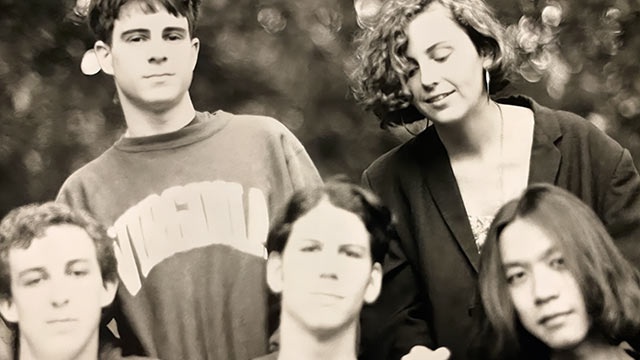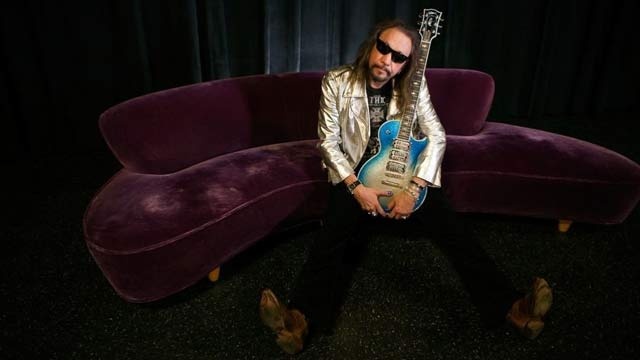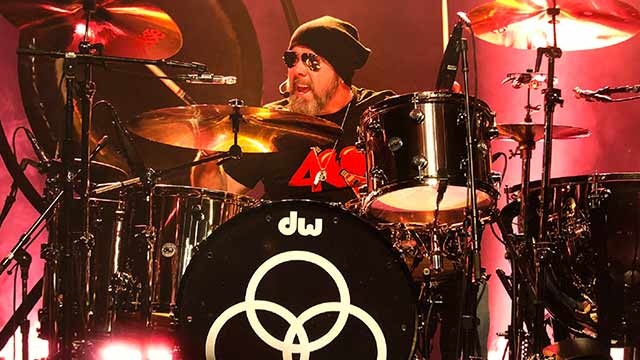1991 may already be familiar to die hard fans, but on February 7, 2025, it will be officially available for purchase on CD and vinyl. Shortly before the release, frontman Greg Ackell spoke with AllMusic from a recording studio, where the band was working on a new album. He discusses 1991, the band’s return, and thoughts on the music scene today.
Let’s jump right into 1991. What was the process like unearthing this time capsule of an album?
“Well…I’m starting to just consider it an album, just recently. It was not an album ever. These were a collection of songs that were demos at the time. We recorded them on rented reel-to-reel eight tracks, and we recorded them largely in our dorm rooms.”
“When we recorded the first demo, we didn’t know exactly what we were going to do with it. I wasn’t really trying to get us shows because I didn’t even know how to send it to a club. I was really young, 18, 19 years old, and I didn’t have a real sense of the Boston clubs or the live scene. But what I did have were records, and on the back of those records were record company names. They were largely in England: Creation Records, 4AD, Factory Records. I just put those cassettes in the mail and sent them over to London. I didn’t really expect much back, but within a week or so, we were getting calls from these labels. And subsequently what happened was that somebody—her name was Colleen Maloney at 4AD—she sent one of those cassettes to Melody Maker and NME. They were the equivalent of, I suppose, Pitchfork or Rolling Stone now. People lived and died by them.”
“A couple weeks after, I got a call from our lawyer and he said, ‘You’re a single of the week in Melody Maker,’ and I didn’t know what the fuck he was talking about because we didn’t have a single. We didn’t have a record deal. We didn’t have an album. We had nothing. But Colleen Maloney had sent that to the press, and the press got a hold of it and really thought a lot of it. They had to make up a label name, because they weren’t supposed to review demos. I think it said Pentatonic Records or something.”
“While we were figuring out who to sign to, we decided to go ahead and make another demo. The first song on that demo was ‘Daymom,’ and when we finally signed our record deal, about a year had gone by. When you’re that age, you’re—we were anyway—moving forward and constantly evolving every day. So when we had this record deal, we were supposed to record our first album. I went to the band and said, ‘Let’s just write a new album. Let’s leave this stuff behind us.’ It wasn’t that the material wasn’t good, it’s just that we were already in a different place. So that’s what became Delaware, our first album, and these demos just remained frozen in time. We left them behind in subsequent years.”
“There were cassettes at the time that went out. I remember we even gave them out to kids at shows. Over the years, once YouTube was invented, someone decided to upload them. It got some attention. We got so many requests, and there was so much interest in it that we just decided to revisit them—to remix them slightly.”
“It’s very hard to tell that we remixed anything. There’s not a lot to remix when you’re talking about eight tracks. But we worked with a good friend of the band’s called Max Rose, a good guy from Seattle that was with us in the early ’90s. When we came back, a lot of people came out from the woodwork. People were interested in helping us out in the way they could. Max worked hard on those to get the fidelity to a level that the band was more comfortable with releasing, and our label, Wharf Cat, was very interested from the very beginning to release this stuff. But once I started accepting that we were going to do it, it was better. Being from so far in the past, it didn’t seem like a priority to me. But we have a fan base, and people want what they want, so we’re glad to be finally putting it out there in some kind of form that we’re comfortable with.”
“We called it 1991 because, well, the songs were written and recorded in 1991. I also very much like that ’19’ and ’91’ are the mirror image of one another. Obviously, this band has a thing for numbers; we called ourselves Drop Nineteens. So I like that kind of symmetry.”
That’s amazing. Had you been thinking about revisiting the album before?
“It came about when the band resurfaced…looking at the band’s history and what there was interest in. But for all those years, no, there was no interest. I mean, I was aware of things on YouTube. People would say to me, ‘Oh, I found this on YouTube, Greg, is this yours?’ and I’d be like, ‘Yeah,’ but I never liked listening to it much in that setting. The audio is pretty awful. Again, they were posting that from cassettes. That was the only way. No one ever had ADATs or anything.”
Do you remember any of your creative inspirations for 1991? Which of those still hold true today, and what has been inspiring you lately that didn’t before?
“In those days, I think there were two albums—two bands in particular that I remember. One of them was My Bloody Valentine Isn’t Anything. Perhaps that’s obvious. If you listen to our music, it’s certainly derivative of it. The second one was Spacemen 3’s The Perfect Prescription. Those two albums just seemed very cool to me. I was also a fan of Sonic Youth’s Daydream Nation; that’s kind of a close third. I was also a big Cocteau Twins fan growing up.”
“I was talking to Neil [Halstead] from Slowdive. I remember when we met 30 years ago, in London, we had both been aware of each other’s bands. When he read the review in Melody Maker, he thought that it sounded like his band. And the same goes for us.”
“What we realized was that we weren’t copying each other so much as we were both inspired by the same kinds of music—the same records, and growing up roughly the same age. We just were on different sides of the Atlantic. It was kind of funny revisiting that with him. Slowdive, to their credit, largely stuck by their sound, whereas my band kind of evolved into other things. You don’t always know what you’re going to get with Drop Nineteens. That’s just our nature. So, the 1991 material does reflect our shoegaziest period. It was certainly new to us, figuring out how to sound like that. It was an exciting time to be discovering how to make those kinds of sounds.”
“But in Delaware, we moved slightly away from that. It’s a little bit less blown out, a little less ethereal. It still has what we call ‘the feels,’ but it was kind of a step away from shoegaze, even though we hear all the time that Delaware is a shoegaze album. I always leave it to other people to describe what genre we are. I’m proudly shoegaze, but I’m not expressly a fan of it. There’s a whole modern shoegaze scene, particularly in America, that I’m still learning about after over a year of being back.”
“All kinds of things move me now. I love the band Deerhunter. I think they’re really smart. There’s a band called Spoon that I think is maybe the best band in the world; I’ve studied everything they do. I’m a big fan of LCD Soundsystem and Car Seat Headrest. These are the bands that I listen to a lot. I’m still a fan of My Bloody Valentine. I’m excited they’re coming back.”
Both My Bloody Valentine and Slowdive, like Drop Nineteens, are bands from the ’90s that had resurrections some two or three decades later. There’s also been a huge resurgence in the fanbases of these ’90s bands due to TikTok. What are your opinions on these kinds of rebirths in music? How do you view your band’s role in the scene?
“Well, it’s only been a service to us. When we decided to come back, I wasn’t even quite aware of this fan base. I’m sort of tuned out. I didn’t have Spotify at the time; I do now. I’m not on social media. But it was fortuitous, and it was a welcome thing once we were back because it means that there’s an audience. But we would have come back and recorded Hard Light whether there was an audience or not. The resurgence wasn’t the reason for doing it, but of course it makes a difference.”
“I wasn’t aware of a few things. I didn’t know if we would be able to record and figure things out and play live. I didn’t know if people would show up. The last time I played on stage was in the early nineties. I would look out at the audience, and they were all people my age. I called them kids back then, ’cause I was a kid, you know, 18 to 22, 23. But the strange thing now is that we play live, and I’m looking at that same age group. It’s uncanny, really. There are people from that era in the audience, but I see them more on YouTube videos of the band, some bald heads in the back. I know that those are the people that are more our era. Everyone in Drop Nineteens still has their hair, but we are accepting of the fact that we’re all getting older. But the kids in the front are the light.”
“I don’t know what makes something go away, and I don’t know what makes it come back. I have noticed that the guitar sound in shoegaze has become kind of ubiquitous. It’s in just about everything; it’s in pop music, it’s in hip-hop—I mean, listen to Earl Sweatshirt. I call it “woozy guitars.” I remember Kevin Shields [of My Bloody Valentine] saying to me that because you’re detuning a chord, the ear and the brain is striving to hear the chord that you’re not delivering. So by definition, it’s kind of a romantic tool because you’re promising something and not delivering it. I mean romantic in the literary sense: something lost, something not quite achieved, something unrelinquished. There’s something about that sound that is very seductive. And I think that people are finally catching on to that, which is cool.”
1991, back when it was still known as Mayfield, was a widely traded bootleg among a lot of your fans. Knowing that many listeners may have already heard some of the tracks or are familiar with them, what are you most hoping that listeners will take away from this album?
“Well, I hope that it satisfies them. It wasn’t easy for us to put this thing out. When we first started to revisit it, we printed up some vinyl ourselves and sold them at the shows we were playing. We got a lot of backlash for that. People were saying, ‘You can’t just release it and only sell it at your shows. What if I can’t get to the show?’ But the problem is that there’s a money component here. Printing up 5,000 albums and distributing them is not something that I can just whip out my wallet and pay for. It was never this band’s position to keep this music from people, but you’d be surprised at the kind of anger that gets out there. So the one thing I hope 1991 does is just make people happy. We appreciate the love, but we’re doing our best, and not everything is quite so easy. We get requests to play in every city, and we can only play where we can play.
Maybe it’s because I’m a little bit new to social media. I’m sensitive to reading anything bad, ever, which is why I don’t even have passwords to our socials. Steve, invariably, my partner in this, will end up sending me stuff, and I get upset. The vast majority of everything has been very positive about us, but I know that there was definitely a thing about 1991 where people were upset when they thought that they weren’t going to be able to get it. Well, now they can.”
“As for the music itself, I enjoy listening to it now too. It sounds better than it ever did. I remember when I got the first copy of it, I put it on the turntable, and I was like, ‘Fuck, this sounds great.’ I don’t know why that’s a shock to me, but whenever I get a product in my hand…sometimes I’m disappointed. I was not with this. I thought it sounded really good. So I hope people enjoy it.”
After the band broke up, you were very convinced that you would never make music again. And after the release of White Dress and Nest, you said that it might be the last thing the band would ever release. Both of these statements turned out to be untrue, and now you’re making a new album. What else do you have in mind for the future? Are you back for good?
“We’re back for now. And…in the end of this book that Tom Faix wrote about us, there were two lines in there that kind of just summed up my feelings at the time. The first one was one of Lana [Del Rey]’s: ‘It was such a scene, and I felt seen.’ The second line was mine on the song ‘Nest,’ and it goes, ‘And for the love of God, awful, I’m so glad that I looked back.’ There’s always the possibility in anything that that’ll be the last thing you do. So I don’t know if the band is back for good, but it’s back for now. Paula [Kelley] just moved back East, which is kind of exciting to us because she was in L.A. all those years. We’re looking forward to writing and recording this next album. We’re probably going to play a few festivals this year.”
Do you think there’s more stability in making music now that you’re older? Or less so because of the feedback from social media coming in from every direction? Is there still some pressure?
“There’s always pressure, but it isn’t from outside. The pressure is from within. Writing music isn’t fun for me, or recording it or anything. Every now and then I have an okay time on stage, a moment where I’m like, ‘Oh, this is kind of cool,’ and I can enjoy it, but it’s not particularly fun. What it is is rewarding. I don’t mean that in a monetary sense, because it’s actually far from that. But I do it because it’s a fulfilling thing to do with one’s life—to go and create something, to try to make something beautiful. It’s a luxury, frankly, in this day and age. That was true when I started, and it’s true now. It’s always a struggle, but it’s worth it.”
“Now that we’re back, it’s become part of me again. And I hope I’m speaking for the rest of the band here, too; there’s a bit of tumult that happens when you leave something behind. Change is not easy. So as difficult as it is, it’s part of me that I’m not quite ready to abandon yet. I do know that when we do put this down, it’ll be for good. I’ve had protestations before, but we’re not going to wait another 20 years to come back. This is the second run, and when we’re done, that will be it.”
I read in a past interview that coming back to the band and to music after so long has felt almost dreamlike. Do you feel like you’ve woken up yet?
“I feel sleepy is what I feel [laughs]. Yeah. Still a bit in the stupor. It’s like a past life, or like waking up and remembering a dream. And the strange thing now is that when I wake up from dreams, I sometimes still have to remind myself that I’m doing this. Like, ‘Oh, we’ve got a show tonight. I’ve got to get to the studio.’ I still wake up in the state of all those years where this was not part of my life, so I have to remind myself that it’s not a dream, that I’ve actually got somewhere to be. I’ve got a track to lay down. I’ve got a sound check at 3 PM. All these things are my life now. Now, I’m starting to dream about my life before I came back.”
To purchase 1991, visit Wharf Cat records.



